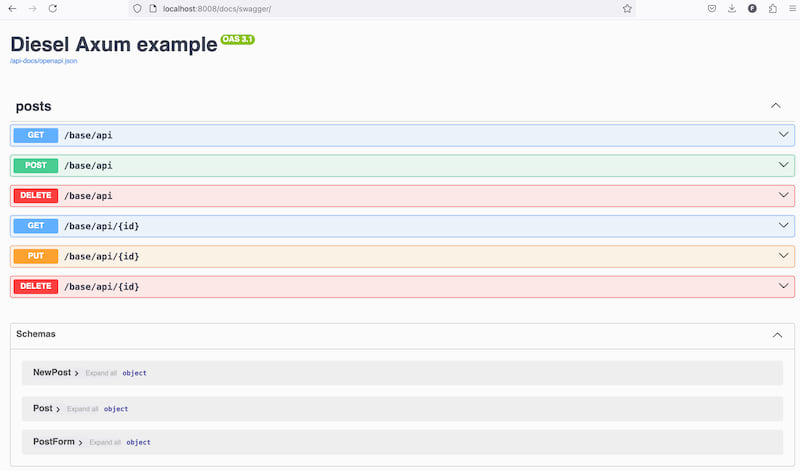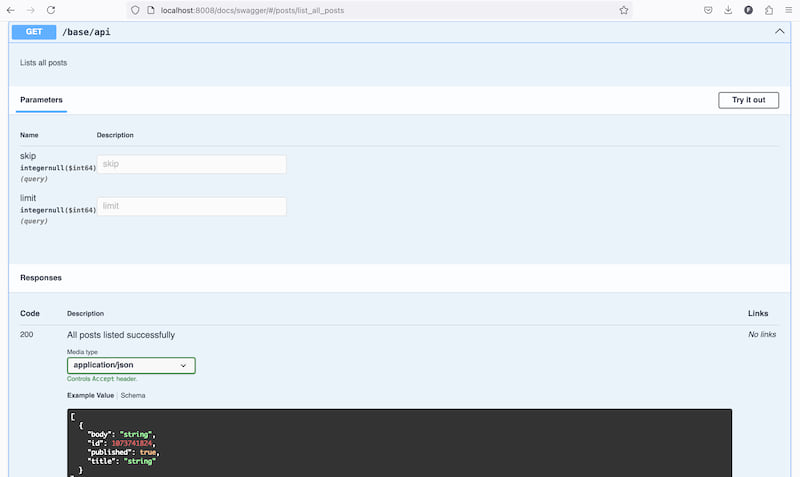1 unstable release
| 0.1.0 | Oct 27, 2024 |
|---|
#1242 in Database interfaces
59KB
1K
SLoC
crud_routers
crud_routers is a library to automatically generate crud routes with given schemas. It is orm and web framework agnostic, highly inspired by fastapi-crudrouter.
Basic usage with Axum and Diesel
Installation
cargo add crud_routers --features axum,diesel
Usage
Below is a simple example of what the crud_routers can do. In just ten lines of code, you can generate all the crud_routers you need for any model. The full example is in diesel_example folder
#[tokio::main]
async fn main() -> io::Result<()> {
let database_url = "postgres://postgres:testpw@localhost/diesel_demo";
let connection = PgConnection::establish(&database_url).unwrap();
let shared_state = Arc::new(Mutex::new(
DieselRepository::new(connection, posts::table)
));
let router = CrudRouterBuilder::new::<AxumServer>()
.schema::<Post, i32>()
.create_schema::<NewPost>()
.update_schema::<PostForm>()
.prefix("base/api")
.build_router()
.with_state(shared_state);
axum::serve(listener, router).await
}
Features
Orm-Agnostic
Following ORMs are implemented, and you can activate them with adding necessary features.
You can easily add new ones by implementing necessary traits.
Api Server Agnostic
Following api servers are implemented, and you can activate them with adding necessary features. You can mix and match them with Orms however you want.
OpenApi support
You can easily add openapi support with feature "openapi" and deriving utoipa::ToSchema for your schemas. You can use all UIs supported by utoipa.
let mut openapi = OpenApiBuilder::new()
.info(InfoBuilder::new().title("Diesel Axum example").build())
.build();
let router = CrudRouterBuilder::new::<AxumServer>()
.schema::<Post, i32>()
.create_schema::<NewPost>()
.update_schema::<PostForm>()
.prefix("base/api")
.build_openapi(&mut openapi)
.build_router()
.with_state(shared_state)
.merge(SwaggerUi::new("/docs/swagger/").url("/api-docs/openapi.json", openapi));

Pagination
Pagination is automatically setup for you. You can use the skip and limit query parameters to
paginate your results.
Skip:
Using the skip (int) parameter, you can skip a certain number of items before returning the items you want.
Limit:
Using the limit (int) parameter, the maximum number of items to be returned can be defined.

Opting Out Routes
If you don't add a schema with create_schema then create item route won't be created.
Same applies for update_schema method and update item route.
Alternatively all routes can be opted out using disable_*_route methods.
CrudRouterBuilder::new::<TestServer>()
.repository::<Repo>()
.schema::<Schema, PrimaryKeyType>()
.create_schema::<CreateSchema>()
.update_schema::<UpdateSchema>()
.disable_list_items_route()
.disable_get_item_route()
.disable_delete_item_route()
.disable_delete_all_items_route()
.disable_create_item_route()
.disable_update_item_route()
Set tag and prefix
You can set a prefix for your url with prefix method.
Leaving prefix makes it the table name.
If "openapi" feature is added then tag method
can be used to set the tag for the api spec.
CrudRouterBuilder::new::<TestServer>()
.repository::<Repo>()
.schema::<Schema, PrimaryKeyType>()
.prefix("base/api")
.tag("My Tag")
TODO
- Add Middleware support
- Create an mdBook for documentation
Dependencies
~3–17MB
~207K SLoC